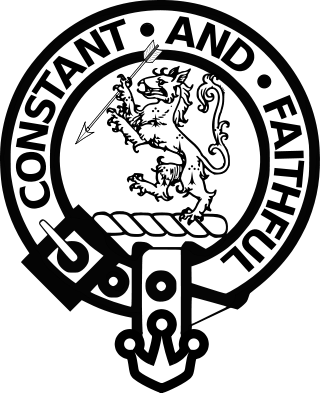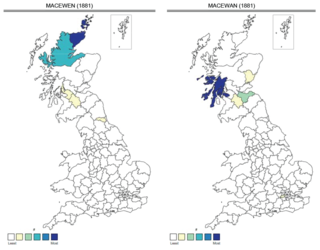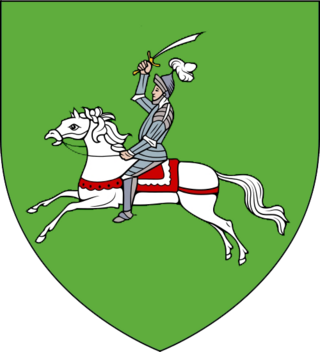
Clan MacNeil, also known in Scotland as Clan Niall, is a highland Scottish clan of Irish origin. According to their early genealogies and some sources they're descended from Eógan mac Néill and Niall of the Nine Hostages. The clan is particularly associated with the Outer Hebridean island of Barra. The early history of Clan MacNeil is obscure, however despite this the clan claims to descend from the legendary Irish King Niall of the Nine Hostages, who is counted as the 1st Clan Chief, the current Clan Chief being the 47th. The clan itself takes its name from a Niall who lived in the 13th or early 14th century, and who belonged to the same dynastic family of Cowal and Knapdale as the ancestors of the Lamonts, MacEwens of Otter, Maclachlans, and the MacSweens. While the clan is centred in Barra in the Outer Hebrides, there is a branch of the clan in Argyll (McNeill/MacNeill) that some historians have speculated was more senior in line, or possibly even unrelated. However, according to Scots law the current chief of Clan MacNeil is the chief of all MacNeil(l)s.
McIver and MacIver are Scottish and Northern Irish surnames. The names are derived from the Gaelic Mac Íomhair, meaning "‘son of Íomhar". The Gaelic personal name Íomhar is a form of the Old Norse personal name Ivarr. Similar surnames or variants include McKeever and McIvor.
McCann or MacCan is an Irish surname. It is derived from the Gaelic Mac Cana meaning "son of Cana". The Irish given name Cana literally means "cub", specifically alluding to a "wolf cub". The Mac Cana were a Gaelic Irish clan who held the lands of Clancann and Clanbrassil, together known as Oneilland, in what is now northern County Armagh. The surname is strongly associated with that part of Ulster.
MacDonnell, Macdonnell, or McDonnell is a surname of Scottish and Irish origin. It is an anglicized form of the Gaelic patronymic Mac Dhòmhnaill, meaning "son of Dòmhnall". The Gaelic personal name Dòmhnall is a Gaelicised form of the name Donald, which is composed of the elements domno, meaning "world", and val, meaning "might" or "rule". The name is considered a variation of MacDonald.
Clan Sweeney is an Irish clan of Scottish origin. The Mac Suibhne family did not permanently settle in Ireland before the beginning of the 14th century, when they became Gallowglass soldiers for the Ua Domnaill dynasty of Tír Chonaill. The clan also claims an Irish descent from a prince of the Uí Néill dynasty, Ánrothán Ua Néill, son of Áed, son of Flaithbertach Ua Néill, King of Ailech and Cenél nEógain, died 1036. Through this descent the clan can claim a descent from Niall Noigíallach.
McManus is an Irish surname. It is derived from the Irish Gaelic "Mac Mághnais", in modern Irish "McMaghnuis" which means "Son of Magnus". Its earlier origin is from the Latin "magnus", meaning "great". The Normans used it to honour Charlemagne (742–814), as Carolus Magnus. Variant spellings of the name include MacManus, Manus and MacManners. The English form, Moyne, is also found in Ulster. In Scotland it is a sept of Clan Colquhoun.
McSweeney is a surname of Norse-Gaelic origin. It is the Anglicized form of the Gaelic Mac Sween or Swein, meaning "son of Suibhne". Despite claims that the personal name Suibhne is of Irish origin and derived from suibneus, suaimhneas, meaning "easy-going", or "pleasant", the eponymous ancestor of the McSweeneys was of Norse-Gaelic descent. According to the Annals of Tigernacht, Swein, Son of Cinaid (Kenneth), King of the Gal-Gaidhil, Died 1034 AD. Claims of the McSweeneys being of Irish origin and descendants of the O'Neills are entirely false and would appear to have been made up for two purposes - firstly to smooth their way into medieval Tyr Connail, where they conquered territory and became kingmakers, protectors and fosterers to the O'Donnells, who ruled that part of Ireland, and secondly, so it wouldn't appear that the O'Neills were having to rely on foreigners to do their fighting for them - especially as the 'cessing' of galoglas

Clan Macqueen is a Highland Scottish clan and a member of the Chattan Confederation. The clan does not currently have a chief and is therefore considered an armigerous clan.

McGowan is an Irish and Scottish surname. It is an Anglicization of the Irish Mac Gabhann and Scottish Mac Gobhann, both of which mean 'son of (the) smith'. Belonging to the Uí Echach Cobo, located in modern-day western County Down, Ulster, they were of the same stock as the McGuinness clan.
Sweeney is a surname that is of Irish origin, derived from the Gaelic Mac Suibhne meaning "son of Suibhne". The Gaelic personal name Suibhne was originally a byname meaning "pleasant" or "well-disposed" and is associated with Clan Sweeney.

MacShane or McShane is an Irish surname. It derives from the Gaelic Mac Seáin or Mac Seagháin and evolved from the given name Shane, a derivative of John. Historically, the MacShanes from Ulster are a branch of the O'Neills, while in County Kerry, the surname was adopted by the Fitzmaurices.
Stephen is a surname of English, Scottish, and German origin. It is a reasonably common surname. The German variant is thought to have originated from the German-speaking world as (Von) Stephan.
The surname MacTavish or McTavish is a Scottish surname, it is one Anglicised form of the Gaelic MacThàmhais, i.e. son of Thomas.
McQueen, Mcqueen, and MacQueen, Macqueen are English-language surnames derived from Scottish Gaelic. There have been several differing etymologies given for the surnames; as well as several differing ways to represent the surname in modern Scottish Gaelic. The surnames are not among the most common surnames in the United Kingdom, Australia, nor the United States.

Suibhne mac Duinnshléibhe was a late 12th-century, and early 13th-century, lord in Argyll. He does not appear in contemporary records, although his name appears in the patronymic names of two of his sons. Suibhne appears in the 16th century Leabhar Chlainne Suibhne, which documents the early history of Clann Suibhne. This account claims that he is the ancestor of Irish clan, and that he was the builder of Castle Sween in Knapdale, Argyll. However, other sources suggest the castle was built in the late 11th century by Suibhne MacAnrahan, brother of the High King of Ireland. Suibhne is said to be identical to the "Swineruo", or Suibhne Ruadh, recorded in the Ane Accompt of the Genealogie of the Campbells, a 17th-century Clan Campbell genealogy.
MacMillan, Macmillan, McMillan, and M'Millan are variants of a Scottish surname; see also the similar surname McMillen. The origin of the name derives from the origin of the Scottish Clan MacMillan. The progenitor of the clan was said to be Airbertach, Hebridean prince of the old royal house of Moray. Airbertach had a son named Cormac, who was a bishop, and Cormac's own son Gilchrist, or in Gaelic, Gille Chriosd, the progenitor of the Clann an Mhaoil, was a religious man like his father. Because of this, Gille Chriosd wore the tonsure, which gave him the nickname Maolan or Gillemaol. As a Columban priest, his head would have been shaved over the front of his head in the style of Saint John the Evangelist, rather than at the vertex of his head. This distinctive tonsure is described in Gaelic as 'Mhaoillan'. The name MacMillan thus literally means, "son of the tonsure".

The Scottish surname MacEwen derives from the Old Gaelic Mac Eoghainn, meaning 'the son of Eoghann'. The name is found today in both Scotland and Northern Ireland. Because it was widely used before its spelling was standardised, the modern name has several common variations.
The Gaelic surname Mac Suibhne is a patronymic form of Suibhne and means "son of Suibhne". The personal name Suibhne means "pleasant".
McCoubrey is a surname linked to Coubrough from the Scottish Lowlands between Glasgow and Edinburgh. The McCoubrey name came into existence in Northern Ireland during the early 18th century. First recorded instances are found in Ballynahinch Presbyterian church records in County Down, between 1701 and 1720 as McCubrogh or McKubrogh.

The Maguire family is an Irish clan based in County Fermanagh. The name derives from the Gaelic Mac Uidhir, which is "son of Odhar" meaning "dun", "dark one". According to legend, this relates to the eleventh descendant of Colla da Chrich, great-grandson of Cormac mac Airt, who was monarch of Ireland about the middle of the third century. From the 13th to the 17th centuries, the Maguire family were kings of Fermanagh.






